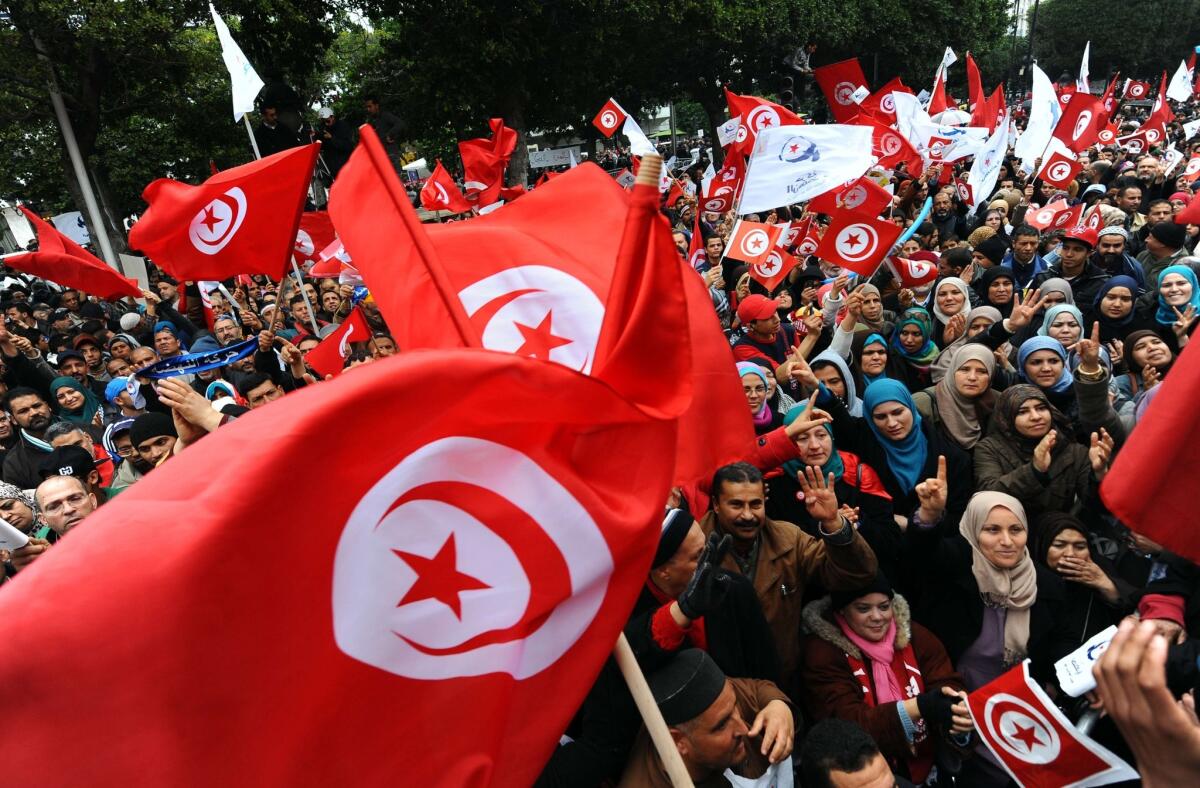Three years after revolution, Tunisians have cause to celebrate

- Share via
It seems the “Arab Spring,” which toppled long-ruling autocrats only to expose simmering religious and sectarian conflicts in the region, did succeed in bringing renewal to one of the countries it swept through three years ago.
Tunisia, where the uprising began with the self-immolation of a desperate young street vendor, marked the three-year anniversary this week of the overthrow of President Zine el Abidine ben Ali, the first of the region’s decades-long leaders to be ousted in the heady atmosphere of revolution in 2011.
Marches through Tunis, the capital, evoked both the gains and setbacks of the post-Ali era, with Tunisians celebrating their evolution from repression to self-determination while also lamenting the assassinations, political clashes and economic turmoil that has dogged the movement’s progress.
But in contrast with turbulent Egypt and civil war-wracked Syria, Tunisians are at a hopeful crossroads. They are poised to approve a new constitution that enshrines Islam as their religion but secular democracy as their form of governance. And the governing Nahda party has peacefully handed the reins of power to a nonpartisan, caretaker government that will run the country until the next multiparty elections are held this year.
The Arab Spring is an ongoing political process whose success or failure will take years more to determine, Dubai political science professor Abdulkhaleq Abdulla asserted in a commentary for the Gulf News.
But the movement “was inspirational for the Arabs and impressed the world with its suddenness and youthfulness,” Abdulla wrote. “It injected some badly needed sense of hope in the terminally hopeless Arab world. The Arab Spring brought freedom to nearly 150 million Arabs in five Arab states which had enough of the highly corrupt one-man and one-party regimes.”
Tunisia’s ambassador to Pakistan, Mourad Bourehla, likewise penned a sober account of the country’s progress toward stable democracy in a commentary for the Daily Times.
“Tunisia has become distinguished not only as the spark that ignited the ‘Arab Spring’ uprisings, but also as the first of these to successfully institutionalize the ‘revolution’ through what have been hailed as the first-ever free, transparent and pluralistic elections in the history of the country,” Bourehla noted.
Alluding to the occasional violence and social strife that has accompanied the transition, the diplomat observed that “Tunisia is not an exception -- democratic transitions are always difficult but with the resilience of the civil society, the active role of the women organizations, the trade unions, Tunisia is about to win the challenge and to be a model for democratic transition.”
Tunisia’s success in achieving compromise and political consensus on a balance between Islamist striving to impose sharia law and liberals’ ardent struggle for a secular state have set it apart from the other revolutionary venues of 2011.
In Egypt, where massive demonstrations ousted the 30-year rule of President Hosni Mubarak in February 2011, voters cast ballots on a proposed new constitution this week that should pave the way for another presidential vote after the first freely elected president, Muslim Brotherhood leader Mohamed Morsi, was deposed in a military coup in July. Prospects for durable leadership of the badly divided country hardly look more promising after the next election, expected to be as contentious as the one that allowed a minority of Islamists to bring Morsi to power.
Syria, approaching the three-year mark of a popular uprising against President Bashar Assad that evolved into a civil war, has suffered at least 120,000 deaths and millions have fled the country for the grim safe havens of refugee camps in Turkey and Jordan. Millions more are displaced inside the country, where the United Nations says half the population is dependent on foreign aid for survival and rebels now fight a two-front war with Assad’s forces as well as Al Qaeda-aligned militants.
Oil-rich Libya, which waged a fierce campaign to rid the country of the 42-year dictatorship of Moammar Kadafi, staged a euphoric election for new leaders in July 2012. But Libyans remain exposed to attacks, kidnappings and chaos as rival militias fight for control of the country and its valuable petroleum assets.
In Yemen, where the 34-year autocracy of President Ali Abdullah Saleh was brought to a negotiated end nearly three years ago, the impoverished country’s tribal structure and infiltration by Islamic militants seeking a base for anti-Western terrorism have stalled progress toward delivering the united and democratic country many hoped for after the revolution.
Tunisia, in contrast, has cause for hope of a better outcome, the elected leader who stepped aside for the next political contest said in a speech Monday.
“We are very far from realizing the objectives of the revolution,” said outgoing President Moncef Marzouki. But Tunisia is on “the right track, [even if] the path is still difficult and dangerous.”
A foreign correspondent for 25 years, Carol J. Williams traveled to and reported from more than 80 countries in Europe, Asia, the Middle East and Latin America.
More to Read
Sign up for Essential California
The most important California stories and recommendations in your inbox every morning.
You may occasionally receive promotional content from the Los Angeles Times.














